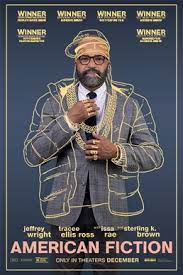Eye For Film >> Movies >> American Fiction (2023) Film Review
American Fiction
Reviewed by: Jennie Kermode

Today it’s easier than ever to publish a book. Self publishing – with or without recourse to the services of an editor – is taking up an increasing share of the market, and small presses are flourishing, but the skyrocketing demand for audiobooks and eBooks has helped the traditional publishing houses to hold on. There’s just one problem: it’s still very difficult for authors to make a living. The best way to do so is to latch onto a trend. In 2023, the buzzword at every major publisher was diversity. Precisely what was understood by this varied, but one group of people always included in the category were African Americans – preferably from poor backgrounds and with tragic tales to tell.
Thelonious Ellison (Jeffrey Wright), known to friends and family as Monk, is African American, but he doesn’t write the right kind of book. He’s admired by his peers and by literary scholars, but not very widely read. Ired by the success of a book which he hasn’t read but which seems to sum up all the clichés of what white readers are looking for from black authors, he decides to write his own pastiche of that type of fiction as a joke, adopting the nom de plume Stag R Lee. Naturally, in the tradition of films of this sort, it becomes the subject of a fierce bidding war, with movie rights also optioned. He’s horrified, but his mother, who is gradually succumbing to dementia, needs end of life care, and his agent keeps reminding him that he really needs the money.

That’s pretty much where the formula stuff ends in a film - adapted from the book Erasure by Percival Everett - which is as playful with its own structure as with its subject. It signals its intentions right at the start. Monk is teaching a university class. His use of a certain slur, written on the whiteboard for all to see, upsets one of his students. She’s white, with turquoise hair, and he doesn’t take the matter very seriously, but as she leaves the room she looks genuinely upset. Next thing we know, he’s hauled into the faculty office. Just when we think we’re in for another tedious debate about free speech in which the student will be criticised for oversensitivity, one of his colleagues points out that this isn’t the first time he’s been in trouble for causing offence – last time around, it was for asking a German student if his family were Nazis.
In line with the species of literature for which Monk advocates, there are no clear cut good guys or bad guys here. He’s a difficult character, often struggling under the weight of his own pretensions and with a good deal to learn from Sintara Golden (Issa Rae), whose We’s Lives In Da Ghetto shows, in its own way, more self awareness than he exhibits at any point. There is more than literature at stake, of course, and the film is made more poignant and satirical by the fact that diversity issues are being handled just as clumsily in Hollywood. In and around the core plot, we get a different angle on the issues and a reminder of what’s at stake by observing Monk’s relationships at work and in his personal life, in which he is a proficient self-saboteur.
Though Erasure predated this, it is of course impossible to watch American Fiction without thinking of the case of Laura Albert – better known as JT LeRoy, the impoverished teenage boy whom she posed as to write three bestsellers between 2000 and 2005. The hoax subsequently gave rise to a documentary and a drama starring Kristen Stewart, neither of which showed as much insight as this film. Monk is alive to the ethical difficulties surrounding his actions (and inaction), which only grow more complex as the story develops. He does have opportunities to back down, but every time he tries to change his fate by doing something so ridiculous that it can’t possibly be taken seriously, white critics love it even more.
The film is full of satirical details. Answering the phone as Stag, Monk responds with the ugly predicate “This is he,” before realising he has confused the caller and switching into Black American English with extra swearing. In a family living room, the television features a trailer for series Black Stories, “celebrating the diversity of the African American experience,” with clips of people getting shot. Some jokes are much subtler – this is a film which will reward multiple viewings – but the easily accessible humour is sufficient to keep viewers going through scenes which are necessarily uncomfortable.
A sort of reverse superhero film, with its protagonist gaining popularity by presenting himself as somebody worse, American Fiction nevertheless challenges his certainty over what does or does not represent an acceptable image of blackness, gradually forcing him to reckon with his own prejudices. It’s a nuanced take on the issue of representation, given added depth by the way that Monk’s ailing mother is increasingly dependent on other people to speak on her behalf, and the arguments which rage over what she wants or needs have much more to do with power relations than with any real personal consideration.
How does one end such a carefully balanced mixture of the sophisticated and the knowingly market-orientated? The conclusion says everything, at its most devastating when simultaneously at its silliest. Cinematic tales of innocent creative talents sabotaged by the system have a long and mostly quite dull history, but American Fiction has reinvented the form. All that remains to be seen is whether or not the institutions it targets will have the guts to embrace it – and, if they do, whether that will simply be a matter of wanting to be seen to cater to diversity, or whether they’ll actually give it some thought.
Reviewed on: 27 Dec 2023

















